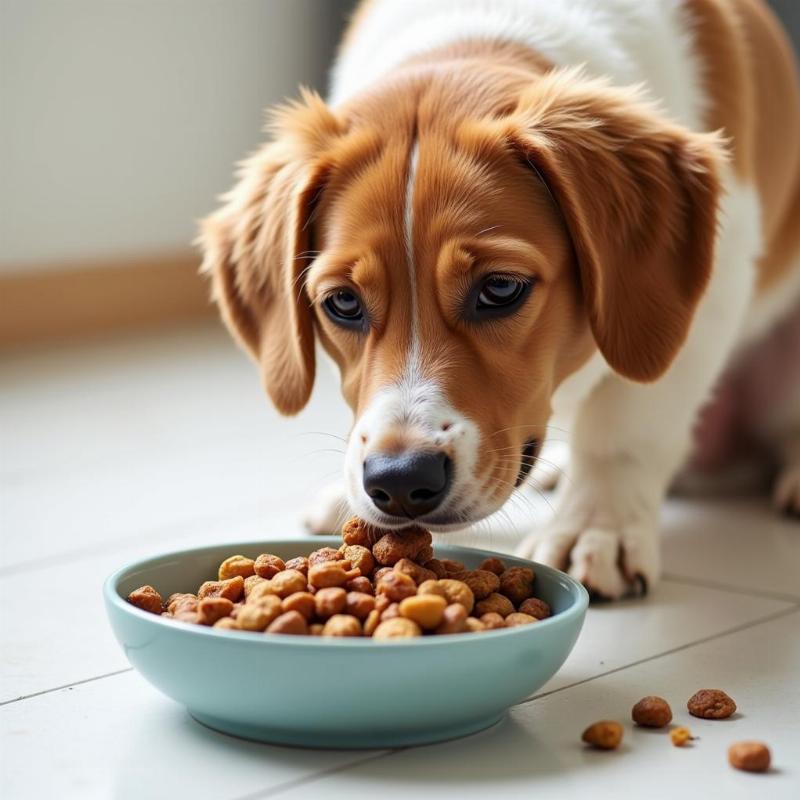Yeast infections are a common problem for dogs, causing discomfort and sometimes even serious health issues. While conventional treatments are available, many pet owners are interested in exploring natural remedies for yeast in dogs. These remedies can often provide relief and address the underlying causes of yeast overgrowth, offering a holistic approach to your dog’s health.
Understanding Yeast Infections in Dogs
Yeast, specifically Malassezia pachydermatis, is a naturally occurring fungus on a dog’s skin. However, certain conditions can trigger its overgrowth, leading to a yeast infection. These conditions can include allergies, a weakened immune system, hormonal imbalances, and prolonged use of antibiotics. Yeast thrives in warm, moist environments, making areas like the ears, paws, and skin folds particularly susceptible.
Symptoms of a yeast infection can vary, but often include redness, itching, a musty odor, hair loss, and greasy skin. If you suspect your dog has a yeast infection, it’s crucial to consult with a veterinarian for a proper diagnosis and treatment plan.
Exploring Natural Remedies
Several natural remedies have shown promise in managing yeast infections in dogs. Remember, these remedies are often used in conjunction with veterinary guidance and should not replace prescribed medications without consulting your vet.
Apple Cider Vinegar
Apple cider vinegar (ACV) can help restore the skin’s natural pH balance, creating an environment less favorable for yeast growth. Diluted ACV can be applied topically to affected areas or added to your dog’s drinking water (always consult your veterinarian for appropriate dilutions).
Coconut Oil
Coconut oil possesses antifungal properties and can soothe irritated skin. Applying a small amount of coconut oil to affected areas can provide relief and help combat yeast overgrowth. Be mindful of your dog’s potential reaction to coconut oil, as some dogs may experience digestive upset.
Plain Yogurt
Plain, unsweetened yogurt contains probiotics that can help restore a healthy balance of gut flora, which can influence skin health. Adding a small amount of yogurt to your dog’s food can be beneficial, but ensure it’s free of xylitol, an artificial sweetener toxic to dogs.
Dietary Changes
A diet rich in processed foods and sugars can contribute to yeast overgrowth. Switching to a high-quality, balanced diet with limited carbohydrates can help regulate your dog’s gut health and minimize yeast proliferation.
 Hình ảnh minh họa một chú chó đang ăn thức ăn lành mạnh để trị nhiễm trùng nấm men
Hình ảnh minh họa một chú chó đang ăn thức ăn lành mạnh để trị nhiễm trùng nấm men
When to Seek Veterinary Care
While natural remedies can be helpful, it’s crucial to seek professional veterinary care if your dog’s symptoms persist or worsen. Untreated yeast infections can lead to secondary bacterial infections and other complications. Your veterinarian can provide an accurate diagnosis, prescribe appropriate medications if needed, and guide you on the safe and effective use of natural remedies.
Conclusion
Natural remedies for yeast in dogs offer a complementary approach to managing this common condition. By incorporating remedies like apple cider vinegar, coconut oil, plain yogurt, and dietary changes, you can support your dog’s overall health and address the underlying causes of yeast overgrowth. Remember to consult your veterinarian for a proper diagnosis and personalized treatment plan, ensuring the best possible outcome for your furry friend.
FAQ
- Can I use any type of yogurt for my dog? No, only use plain, unsweetened yogurt without xylitol.
- How often can I apply apple cider vinegar to my dog’s skin? Consult your veterinarian for the appropriate dilution and frequency.
- Are natural remedies a replacement for prescribed medications? No, natural remedies should be used in conjunction with veterinary guidance and not as a replacement for prescribed medications without consulting your vet.
- What if my dog’s symptoms don’t improve with natural remedies? Consult your veterinarian for further evaluation and treatment options.
- Can diet really impact my dog’s yeast infections? Yes, a diet high in processed foods and sugars can contribute to yeast overgrowth.
- How can I prevent yeast infections in my dog? Maintaining a healthy diet, regular grooming, and addressing underlying allergies can help prevent yeast infections.
- Is coconut oil safe for all dogs? While generally safe, some dogs may experience digestive upset with coconut oil. Introduce it gradually and monitor their reaction.
Beautdogs.us is your trusted source for comprehensive and engaging information on dog care and companionship. We offer expert advice on dog breeds, grooming, nutrition, and holistic health approaches. Whether you’re a new dog owner or a seasoned expert, Beautdogs.us provides valuable resources to help you navigate the joys and challenges of dog ownership. Connect with us for personalized support at [email protected] or call us at +1 501-555-7529.